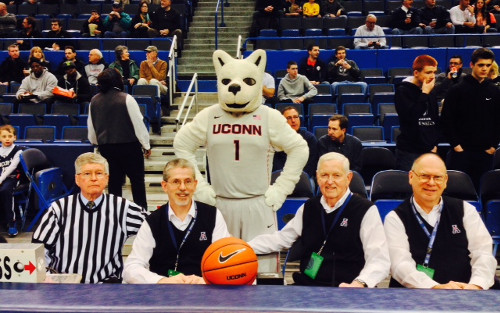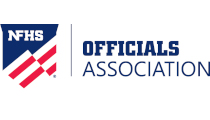Life After Officiating – Consider Game Management
By Ken Devoe on September 02, 2014 officials PrintChances are you began officiating to stay involved in a sport you love long after your playing days were over. But some day, due to age, injury or family obligations, the time may come when officiating is no longer practical or possible.
Yet your passion remains for the sport, for the excitement of the games, the camaraderie of fellow officials, and for the challenges that accompany the opportunities for you to contribute.
Many former officials have found a satisfying, rewarding outlet for that passion – operating game clocks, shot clocks and scoreboards, keeping the scorebook and other duties that fall under the umbrella of “table/game management.”
Good game management is in demand
As an official, you know how important it is to have people performing these tasks who are knowledgeable, competent, impartial and totally focused. It makes an official’s job much easier. Conversely, you know what a nightmare it is when the people performing these tasks don’t know what they’re doing or are distracted and make mistakes that impact your game.
It’s no surprise, then, that there is a significant demand for table/game management personnel who do things right. Opportunities range from volunteer positions at various levels of play to organizations (albeit very few) that supply trained, paid professionals to colleges, universities and professional sports teams.
One such organization is Timing is Everything (TIE), headquartered in eastern Connecticut. TIE was founded in 2005 by former long-time high school and college basketball and soccer official -- and retired Army Brigadier General -- Dave Boland, along with charter members Tom Weston and Bill Fortin, who have extensive officiating and game management backgrounds.
The idea for TIE was generated 18 years earlier when Boland and Fortin were officiating an University of Connecticut soccer game. A member of the university’s athletic staff asked them if they would be interested trying out for table activity assignments at UConn basketball games. The request arose from a directive from the Big East to member schools, urging them to stop entrusting table duties to students, interns, or assistant coaches, and instead hire professional, knowledgeable personnel to ensure impartiality.
“We started with five people working UConn basketball games,” Boland said. “Then they asked us to do their soccer games. Soon we got calls from other schools such as Connecticut College, the Coast Guard Academy, Yale, Harvard and Southern Connecticut State University. We gained a reputation because we had something these schools wanted -- namely stability and neutrality of table personnel. In other words, we brought professionalism to the assignments.”

A crew of former officials turned table management personnel from Timing is Everything at the 2/15/14 men's basketball game between Memphis and UCONN at the Hartford XL Center. Pictured left to right: Official scorer Bob O'Day, scoreboard operator Tom Weston, game clock operator Dave Boland, and shot clock operator Dick Nordgren. Photo courtesy of Timing is Everything and the University of Connecticut.
Demand grew. So did the enterprise. Today, TIE provides game management personnel for nine sports, including basketball, football, lacrosse and field hockey and serves 121 teams primarily at the college and pro levels. TIE also handles table functions for state high school football and basketball tournament finals on behalf of the Connecticut Interscholastic Athletic Conference (CIAC), the governing body of Connecticut high school athletics.
TIE’s staff has grown to approximately 60 trained professionals. What’s interesting is their background. “Ninety percent of our staff consists of former sports officials,” said Boland. “We offer the chance to work in the sport that they officiated. That’s a big reason they come to us.”
Another attraction for former officials is the opportunity to work high profile contests. Boland’s staffers have worked such events as the NCAA D-I National Semifinals and Finals in men’s lacrosse at Gillette Stadium, NCAA D-1 women’s basketball East regionals, and the Big East Women’s Basketball Finals. They also staff the table for preseason Boston Celtics games and for the WNBA’s Connecticut Sun.
The benefits of game management
We talked with some of the former officials who work with Timing is Everything about their transition from officiating to game management and, to a person, they say they are having a blast.
Steve Kirck is a highly acclaimed high school and college football and basketball official. He retired from 30-plus years in each sport and went out in style. His last college basketball game was the ECAC D-III championship game in 2006. His high school basketball finale was the 2012-13 CT State Class L boys championship game, after which he called it a career. “I knew the time had come to get off the court, but I couldn’t just sit at home,” Kirck said. “I wanted to stay in contact with a lot of the guys I officiated with over the years, and this was a perfect way to do it.”
Lisa Navin is a nurse in the Hartford, Connecticut, area. She officiated high school field hockey for 20 years. UConn hired her to time its field hockey games. When UCONN turned to Timing is Everything for those services, she joined TIE and continued working field hockey at UConn. She expanded her capabilities to women’s basketball, which was a challenge because she had never officiated basketball. She did so well that she was assigned to the shot clock for the Big East women’s final at the Hartford Civic Center featuring the nation’s top two teams -- UConn and Notre Dame. “Being part of that environment was very exciting,” Navin said. “What a great way to continue my career.”
Bob O’Dea officiated high school basketball for 44 years and soccer for 39 years, including 20 years at the collegiate level. He has been with Boland’s organization for a dozen years and is the official scorer for UConn men’s and women’s basketball. “Having officiated and being around athletics for so long, this is a great way to continue without the wear and tear of running. Just to be part of it now gives me that jogger’s high that I had when I was an official.”
Ray Pollick is a veteran of 30 years in the Navy. He was stationed in New London, Connecticut, and joined the area’s sports officials associations. He recently ended a long and successful high school football officiating career by working a state championship game to finish the 2012-13 season. “I told my wife that when I turned 65, I was going to walk away from it all,” Pollick said. “She said ‘No, you won’t.’ She was right.” He joined TIE and as a result, he’s working most nights at some sporting event. “There’s a competitiveness that’s engrained in us when we’re officiating and it never leaves. Now I can stay in the game and keep in touch with many of the people I knew and worked with through sports.”
Explore the opportunities
There aren’t many – if any – organizations like Timing Is Everything elsewhere in the country where you can get trained and then paid to be at the table (the best seat in the house) or in the booth for high profile college and pro sports. However, you can stay in the game you loved when you officiated. If there is no professional game management organization in your area, contact Dave Boland at Timing is Everything to learn about possible local or regional opportunities. You can email him at [email protected].
As an official, you offer something most people coming in off the street don’t. You have in-depth knowledge of your sport, which is a huge plus when you’re functioning at the table. Plus, you have a passion for the game that few non-officials share. You’re competitive and you want to perform well. That’s a great combination.
Game management is a terrific way to stay involved in the sport that you have enjoyed officiating and to maintain the friendships and relationships you developed over the years. Whether you are paid or you volunteer, the benefits are pretty much the same. Boland and his team members sum it up this way: “We get a lot of personal and professional satisfaction. That’s what it’s all about.”
Ken Devoe
Ken Devoe is a freelance writer specializing in corporate communications. He is has officiated high school basketball for the last 14 years in the New Haven, CT area and is past president of IAABO Board 10. He is also a member of the NFHS Officials Publications Committee.
Most Recent Articles
- nfhs news NFHS Learning Center Delivers 25 Millionth Course
- Track & Field/Cross Country article Effective Communication with Athletes and Coaches
- nfhs news Player Equipment Changes Highlight 2025 High School Football Rules Revisions
- Player Equipment Changes Highlight 2025 High School Football Rules Revisions
- nfhs news Judgment Call on Second Contact Eliminated in High School Volleyball






